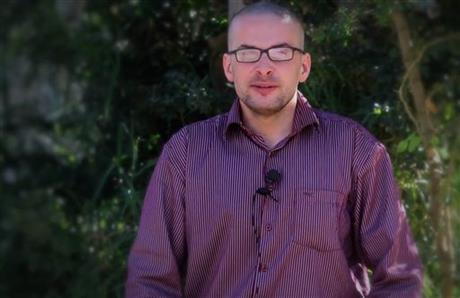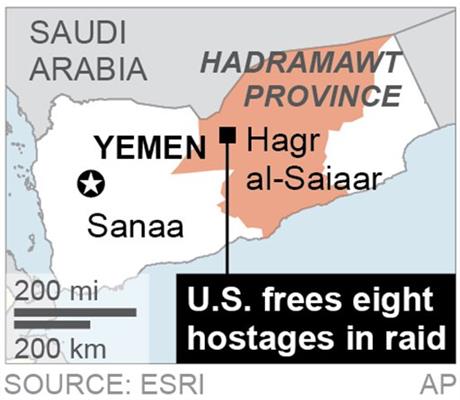 By AHMED AL-HAJ
By AHMED AL-HAJ
Al-Qaida’s branch in Yemen threatened an American hostage kidnapped over a year ago, giving Washington three days to meet unspecified demands in a new video released Thursday.
The hostage, identified as 33-year-old Luke Somers, an American photojournalist born in Britain, is shown for the first time in the video, which was posted on the al-Qaida offshoot’s Twitter account. The video comes weeks after an apparent unsuccessful attempt by U.S. special forces to rescue Somers in a raid in the remote Yemeni desert.
The footage apparently seeks to mimic hostage videos released by al-Qaida’s rivals from the Islamic State group, which has threatened — and later beheaded — several American and British hostages in the aftermath of a summer blitz that captured much of Iraq and Syria. The IS fighters have at times battled al-Qaida and prompted defections among their rivals.

Somers was kidnapped in September 2013 from a street in the Yemeni capital, Sanaa, where he had worked as a freelancer for the Yemen Times. Since his capture, Yemeni journalists have been holding sit-ins in Sanaa to press the government to seek his release.
Somers was likely among a group of hostages who were the objective of a joint rescue mission by U.S operation forces and Yemeni troops last month that freed eight captive in a remote area of dunes called Hagr al-Saiaar near the Saudi border in Hadramawt province.
At the time, a Yemeni official said the mission failed to liberate five other hostages. Among them were an American journalist and a Briton who were moved elsewhere by their al-Qaida captors days before the raid. The American was not identified by name and Yemen did not officially confirm the participation of U.S. commandos in the rescue mission — a rare instance of U.S. forces intervening on the ground in Yemen.
In the 3-minute video, Somers appears somber and gives a brief statement in English, asking for help. The video was first reported by SITE Intelligence Group, which monitors militant sites.
“It’s now been well over a year since I’ve been kidnapped in Sanaa,” Somers said. “Basically, I’m looking for any help that can get me out of this situation. I’m certain that my life is in danger. So as I sit here now, I ask, if anything can be done, please let it be done. Thank you very much.”
Before Somers’ statement, the video shows local al-Qaida commander Nasser bin Ali al-Ansi, reading in Arabic and speaking about alleged American “crimes against” the Muslim world.
Al-Ansi criticizes US-led airstrikes against the Islamic State group and President Barack Obama for his “latest foolish action,” referring to the “failed operation” in Hadramawt. He says an “elite group of mujahedeen,” or holy warriors, were killed in the U.S. raid.
He also warned the U.S. against more “stupidities,” referring to future attempts to rescue hostages.
Al-Ansi gives the U.S. three days to meet al-Qaida’s demands or “otherwise, the American hostage held by us will meet his inevitable fate,” without elaborating or explicitly saying they would kill their captive. He doesn’t specify the demands but says Washington is “aware” of them.
Al-Qaida in the Arabian Peninsula, as the Yemeni group is known, is considered by the U.S. to be the world’s most dangerous branch of the terror network and has been linked to several failed attacks on the U.S. homeland.
Abduction of foreigners has been common in impoverished Yemen, troubled both by al-Qaida and the advance of Shiite rebels, but while kidnapping for ransom was common in the past, threatening a hostage’s life appears to be a shift in the al-Qaida branch’s tactics.
A tribal leader in Hagr al-Saiaar said he has learned from local tribal mediators that U.S. officials have rejected their mediation offers in hostage cases. A second tribal figure, also close to tribal mediators, said outreach efforts to Qatar, a traditional mediator in the region, went nowhere.
In February 2013, Swiss researcher Sylvia Abrahat was released from a year in captivity in the southern Yemeni port city of Houdeida after months-long Qatari mediation.
Also Thursday, Yemeni security officials said the body of a Yemeni hostage who had been held captive together with Somers, was found in the district of al-Qatn in Hadramawt late Wednesday.
The officials identified the man as Rashid al-Habshi and said the al-Qaida Yemeni branch had broadcast his purported “confession of helping” Americans carry out drone strikes against militants. The Yemeni officials and the tribal figures spoke on condition of anonymity in line with regulations.
The U.S. drone strikes, targeting suspected militant gatherings, have become increasingly unpopular in Yemen due to civilian casualties.
___
Associated Press writers Maggie Michael and Katarina Kratovac in Cairo contributed to this report.



